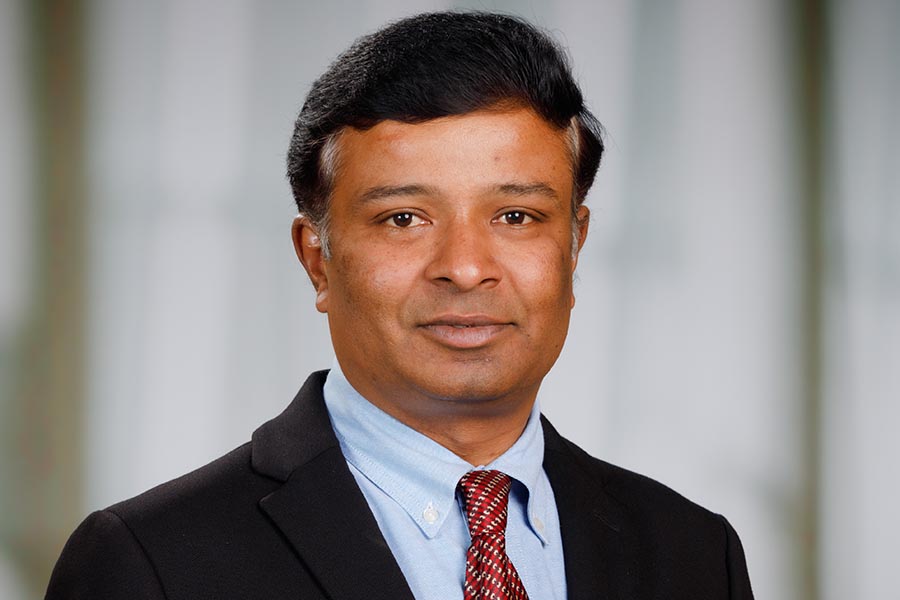Dr. Mohan Krishnan's R01 Anemia Research Transfers to UNMC

This summer, Mohan Krishnan, PhD, associate professor, Department of Biochemistry and Molecular Biology, joined UNMC. In his previous position, he received NIH funding for his pediatric anemia research. Recently Dr. Krishan received notification that he will be able to transfer his R01 project to UNMC. Dr. Krishnan spoke with us about his research and his new role as a co-champion for CHRI's Genetics, Development, Exposures and Injuries area of emphasis (AOE).
Please describe your research that received an NIH R01 that has been transferred to UNMC.
Anemia is nearly universal in preterm infants and is associated with increased morbidity and mortality worldwide. Anemia is caused primarily by phlebotomy essential for medical care and is exacerbated by a variety of factors inherent to immaturity in the ex-utero environment (e.g., low erythropoietin levels, high postnatal oxygen tension and more). When anemia is severe enough to be treated with red blood cell (RBC) transfusions, clinicians must be aware of the risk of critical adverse effects such as necrotizing enterocolitis (NEC), an inflammatory bowel necrosis characterized by macrophage precursor(s) infiltration and a leading cause of mortality in those born before 28 weeks of gestation. We have recently elucidated the connection between anemia and NEC, specifically, the “leaky gut” phenotype that leads to monocyte infiltration, as well as RBC transfusion-associated activation of these monocytes, and the resulting intestinal mucosal injury.
Notably, our patent-protected animal model is the first and only model ever developed to investigate this phenomenon, and it finally provides mechanistic insights into the association between blood transfusions and NEC that had been identified in more than 25 clinical studies. With support from the NIH, this animal model has resulted in four first-authored manuscripts, including our seminal publication in Nature Communications and a U.S. patent. In the present NIH-awarded application, we now seek to define these monocyte populations which we believe are hepatic in origin and investigate their role(s) in anemia and gut mucosal injury during RBC-transfusion.
How will your research continue at UNMC?
My re-located research team includes Balamurugan Ramatchandirin, PhD, (instructor) and Marie Amalie Balamurugan, MS, (research technician). Here in the Department of Biochemistry and Molecular Biology at UNMC, we will continue the study of inflammatory mechanism(s) involved in neonatal anemia and RBC transfusion-associated Systemic Inflammatory Response Syndrome (SIRS) and their connection to NEC. We have been excited to secure a state-of-the-art blood analysis system from a medical diagnostic equipment company that has recognized the significance of our work. This equipment is available to us for the next three years and will allow us to use miniscule aliquots of blood (as low as 20 microliters) for analysis. Additionally, as adjunct faculty in UNMC Department of Pediatrics, I will be working with the Division of Neonatology and CHRI to share research expertise in this area and build collaborative projects.
What drew you to working as a co-champion in the Genetics, Development, Exposures, and Injuries AOE?
With long-standing research experience in fetal and neonatal development, I am excited to enhance the intellectual atmosphere for both clinicians and basic scientists. I understand the impact that altered development has on the quality and lifespan of vulnerable neonates and look forward to expanding this space with likeminded colleagues.
How do you feel the recent Microbiome Mini Research Summit went?
I enjoyed the microbiome mini research summit very much. At the summit, I gained new ideas about the microbiome’s role in development of Necrotizing Enterocolitis in premature infants, and I was impressed with the wide range of microbiome research across UNMC.
Are you able to give any information about what the next plans are for your AOE?
I would be interested in building a team of researchers (clinicians and basic scientists) with expertise in neonatal inflammation and injury. I would also like to conduct a workshop to teach the developmental science behind the practice of neonatology to fellows and residents through the CHRI AOE.